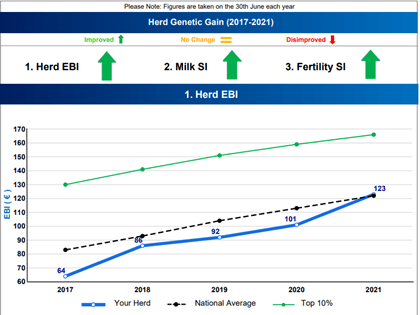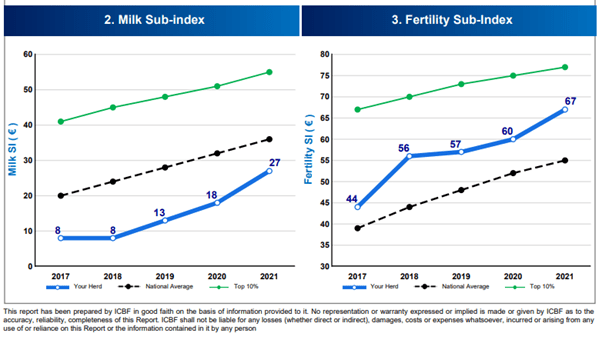Genomics driving progress in Co. Kerry
We are a family run, 80 cow dairy herd in North Kerry. We are striving to achieve a herd of high EBI cows in a grass based system, feeding just under a tonne of meal per year. We rear our own replacements on farm and all other calves are sold at a couple of weeks old.
In the past, we would have been using stock bulls to breed our replacements and very little AI was used. In 2017 our herd EBI was €64 and lagged well behind the national average. The herd was selling on average about 350kg of milk solids per cow and for a Spring calving dairy herd our 6- week calving rate was around 55%.


In 2020 we increased our AI usage to try and improve our rate of genetic gain. We found this was a big help. As well as this we purchased some high EBI heifers. The next thing we looked into was genotyping our replacement heifers. We immediately saw the benefits of genotyping as a couple of sire errors we didn’t know we had got rectified and we got genomic indexes for the heifers. Their indexes increased in reliability by 25-30%. Within the group there was a lot of re-ranking in terms of EBI but also within the individual traits in their indexes. Based on these results we selected AI bulls specifically to breed with these heifers based on the strengths and weaknesses of each of their indexes. We haven’t looked back since!
Through making more informed breeding decisions, our herd EBI has increased to €172 in 2023. Our milk sub index has risen to €40 and our fertility sub index has increased to €86 this year.

Our gains in genetics is reflected in our on farm performance. In 2022 we sold 430kg of milk solids per cow. This was without a change in diet. If you were to assume the value of a kg of milk solids was €6 then through the increased performance we have generated an additional €420 in milk sales per cow per year compared with where we were. The herd fertility has seen a major improvement also. Our 6 week calving rate has increased to 75% in 2023 which represents a 20% increase from where we were. The improvements in fertility can also be seen in our breeding season with a 6 week submission rate of 96% in cows and 100% in heifers in 2023.
DNA Calf Registration
We joined the DNA Calf Registration Pilot in 2021. As part of the pilot, we genotyped all our cows using button tags. This gave us more reliable indexes when it came to making breeding decisions for the cows as well as fixing any parentage errors that were in the herd. We saw an increase of approximately €20 in our overall herd EBI after genotyping the cows.
Once all cows were genotyped we started using Double Tissue Tags to genotype all of our calves at birth. Every calf was sire, dam and sex verified before we received the calf’s passport. This meant that any errors in the calf registrations were picked up and rectified beforehand so we didn’t have to get any calf passports updated with our DVO. The other major benefit is getting genomic indexes on our calves at a very young age. For dairy heifer calves it meant we could see at a couple of weeks old their genetic potential allowing us to keep the very best as replacements. Breeding and rearing replacement heifers is expensive so it is crucial for us that we only retain the very best of the group for breeding.
We have seen considerable gain as a result of genomics in the genetic merit of our calves. We continue to see rapid gain in EBI, milk sub-index, fertility sub-index and other traits in our calves. When we compare our 2022 and 2023 calves we see a €28 improvement in our 2023 calves. The national average rate of genetic gain is somewhere in the region of €12 per year, so thanks to genomics we progressing at a rate of over twice the national average. We have high hopes for these calf crops.
Our 2023 bull team as an average EBI of €339, milk sub- index of €102 and fertility sub-index of €155. Like many dairy farmers we are putting a lot of emphasis on using good quality beef AI on our cows to produce a good quality saleable calf that is of good merit for beef finishing. This year we have used Simmental, Limousin, Aubrac, Hereford and Angus and we have aim to pick bulls that are of reasonable calving difficulty but with a good beef value on the Dairy Beef Index. By using these bulls of high carcass merit it helps ensure we have calves to sell that have high values on the Commercial Beef Value (C.B.V). Producing high CBV calves going forward will be important for the farmer who rears and finishes these calves.
The future
There are a lot of great herds in the country that are doing in excess of 500kg milk solids per cow on a grass based system and that is very much where we want to get to. We firmly believe that through genomics and breeding we will be able to achieve this without increasing inputs and adding additional costs to the system.
An interesting technology that will soon be available for fully genotyped herds is Genocells. By having all our cows genotyped we will soon be able to take a milk sample from our bulk tank, send it off and within a few days we wlll have cell counts back for all of our cows. This will be a very quick and extremely labour efficient way to get SCC results for all our cows. We generally milk record about every 2 months and we have worked hard to improve our SCC in recent years with it getting down to 101 in the last milk recording. In the time in between milk recordings now we now will hopefully have a tool that if we have a spike in SCC we can just take a milk sample and that will allow us to find the offenders quickly.
If you are interested in getting involved in DNA Calf Registration, then you should apply for the National Genotyping Programme. Applications can be made online at www.icbf.com. For more information on the programme and what’s involved see here National Genotyping Programme.
